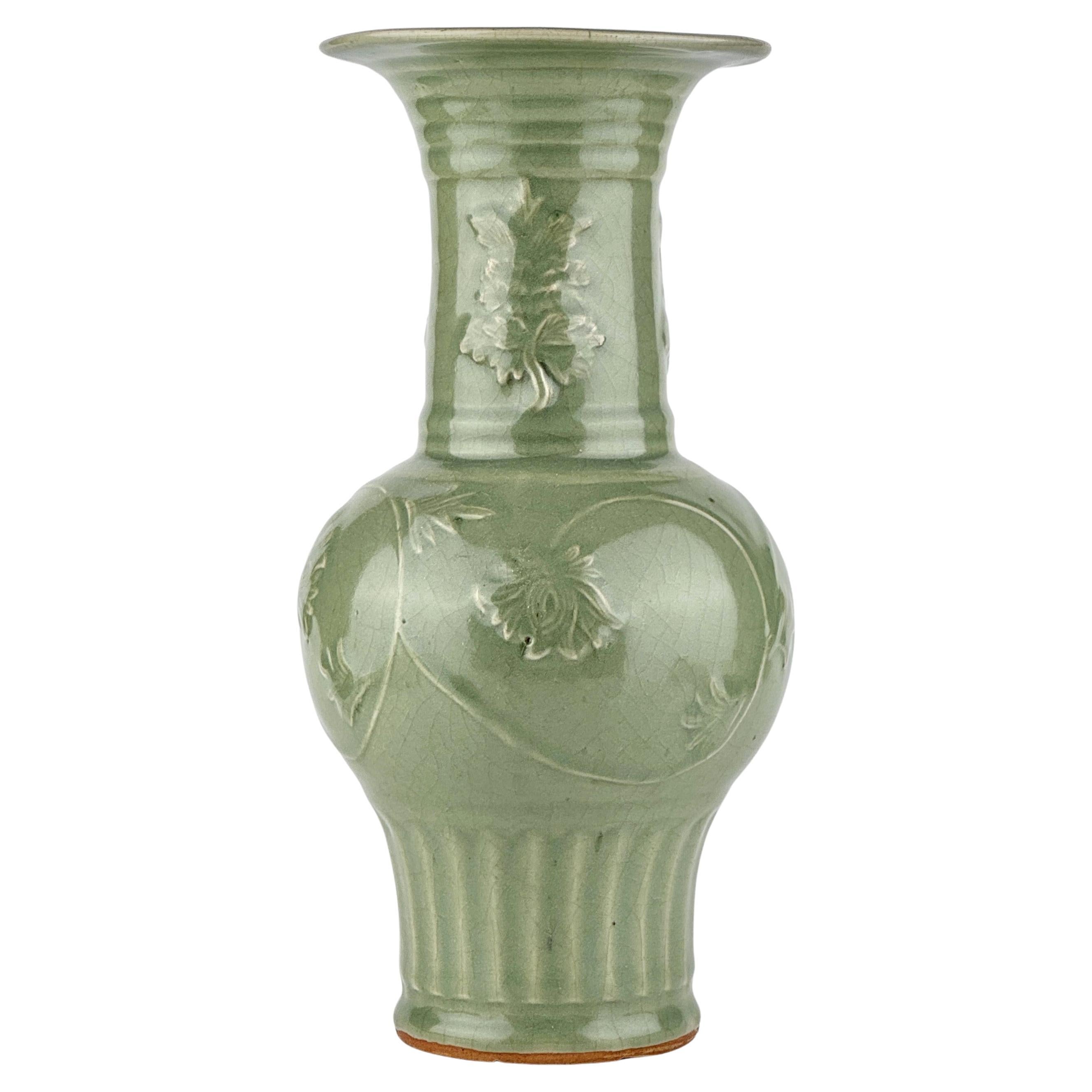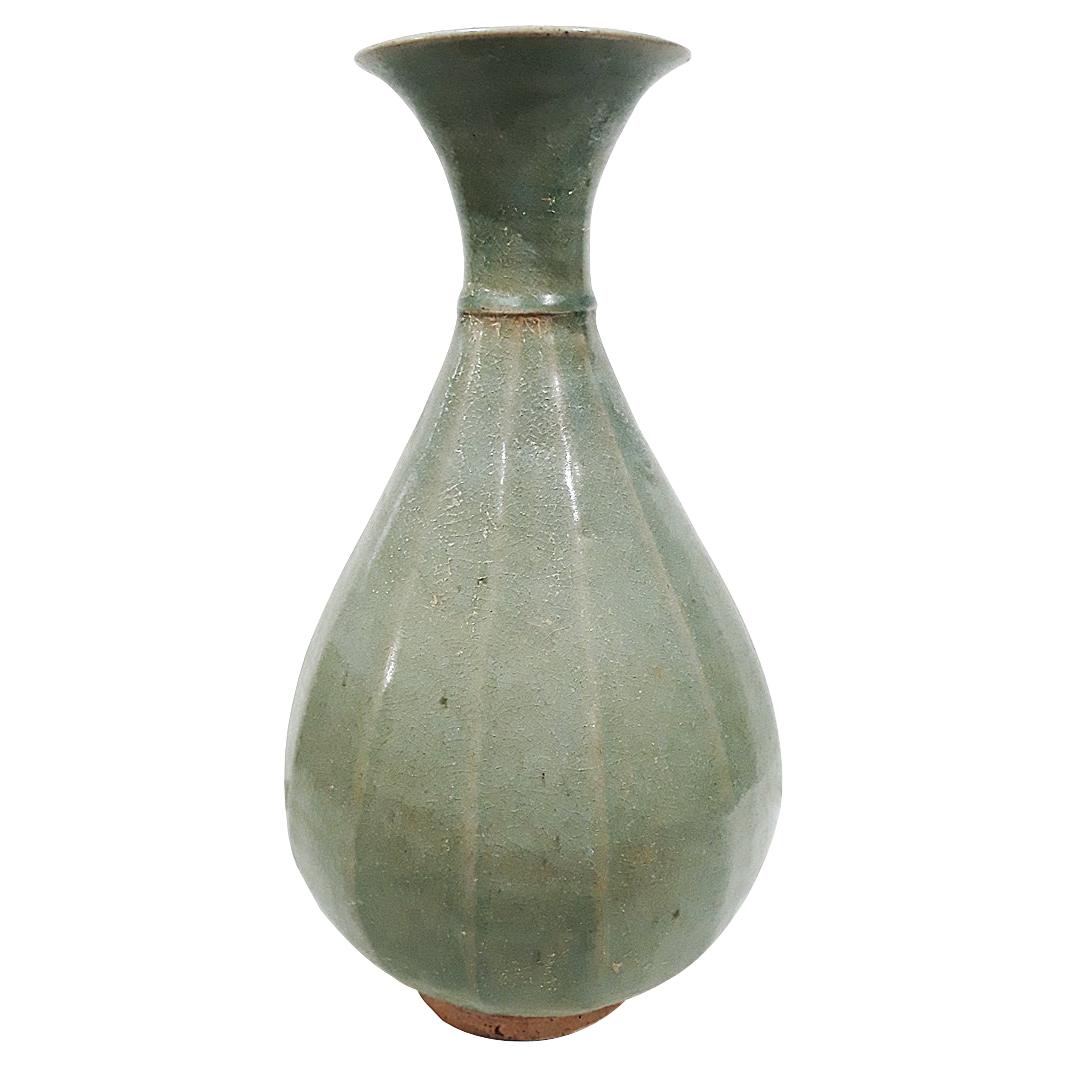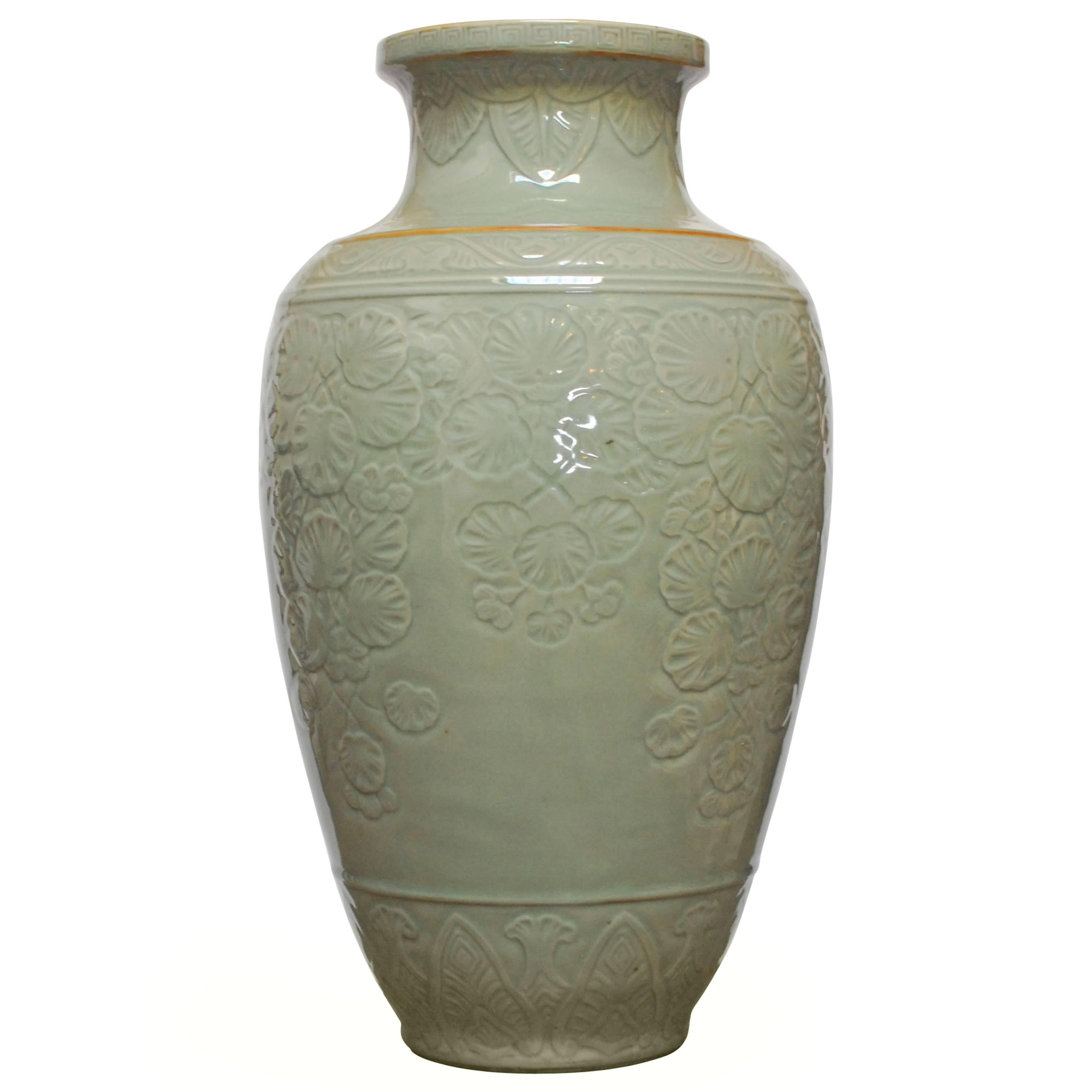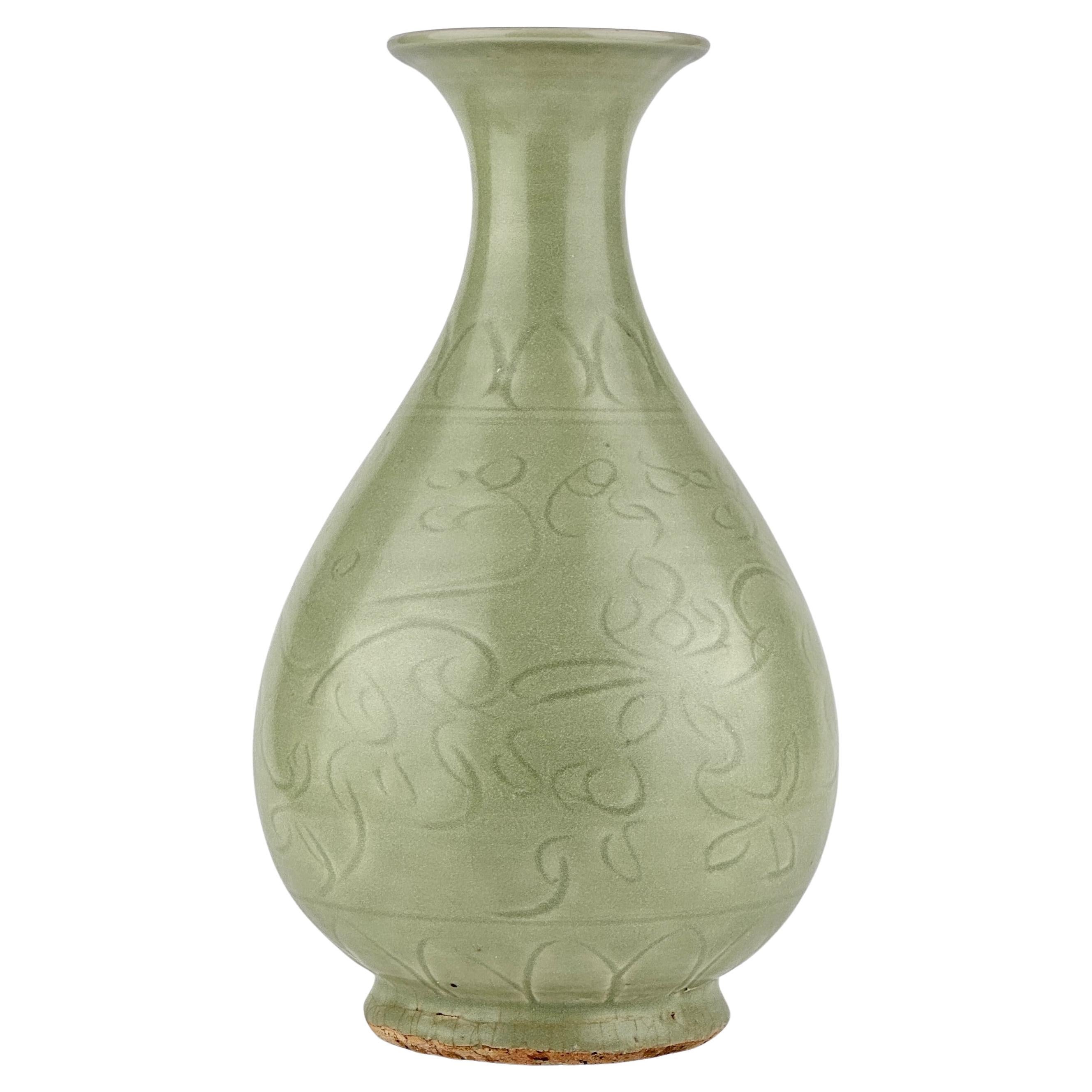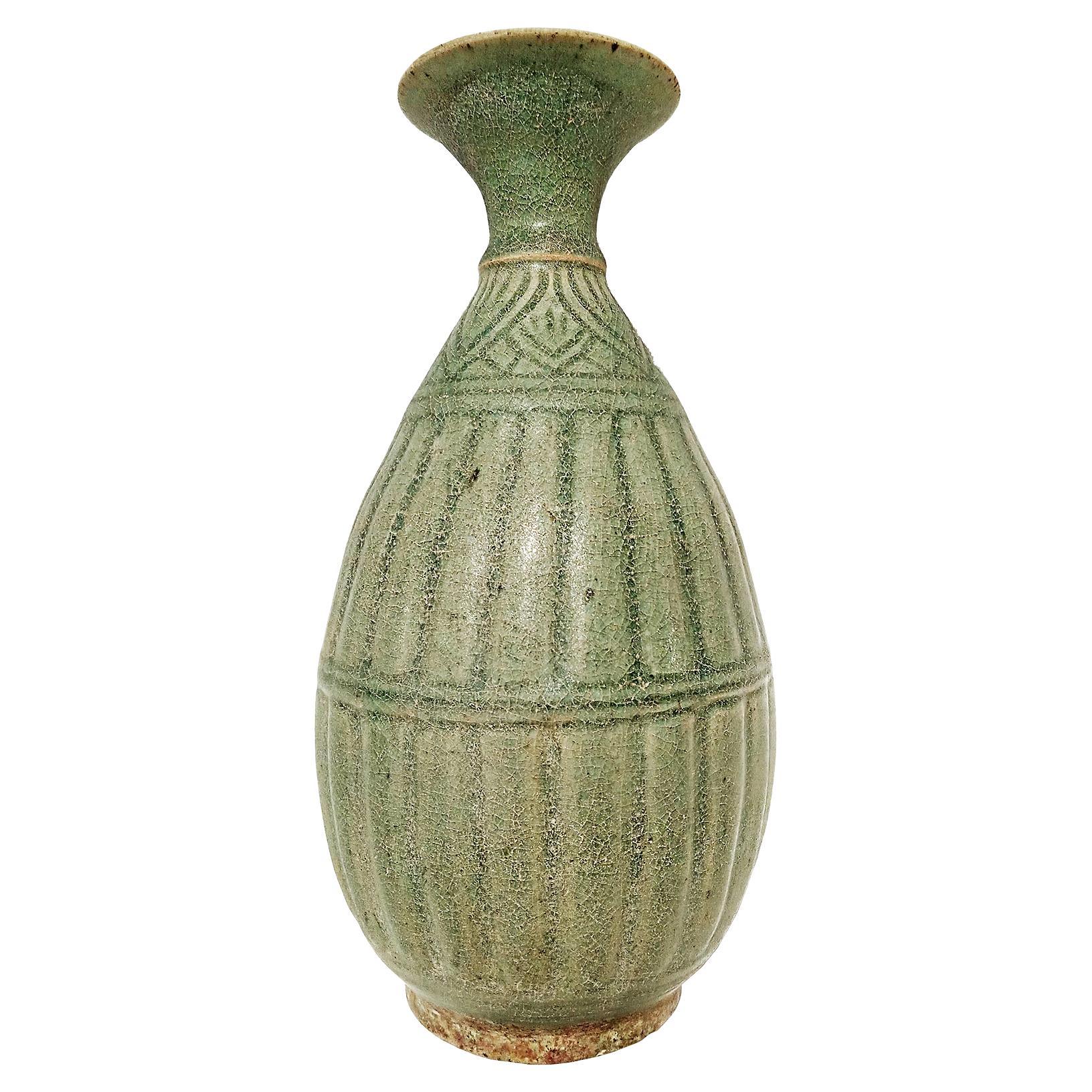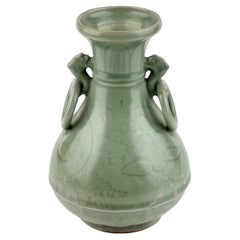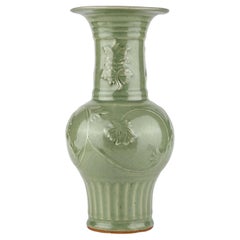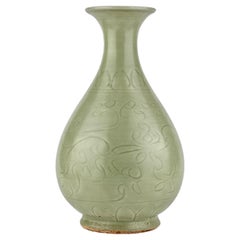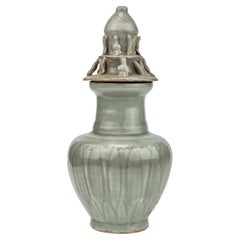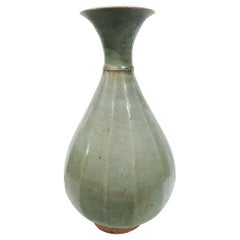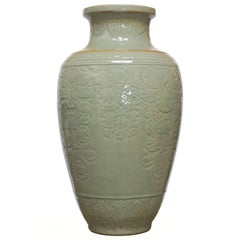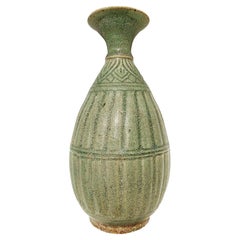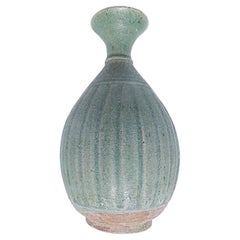Items Similar to Celadon Vase, Five Dynasties or Northern Song dynasty, 10th-11th Century
Want more images or videos?
Request additional images or videos from the seller
1 of 10
Celadon Vase, Five Dynasties or Northern Song dynasty, 10th-11th Century
$3,960
$9,90060% Off
£3,006.92
£7,517.3060% Off
€3,438.64
€8,596.6060% Off
CA$5,532.69
CA$13,831.7460% Off
A$6,153.56
A$15,383.9160% Off
CHF 3,213.20
CHF 8,03360% Off
MX$74,882.32
MX$187,205.8160% Off
NOK 41,037.46
NOK 102,593.6660% Off
SEK 38,485.90
SEK 96,214.7560% Off
DKK 25,663.89
DKK 64,159.7160% Off
Shipping
Retrieving quote...The 1stDibs Promise:
Authenticity Guarantee,
Money-Back Guarantee,
24-Hour Cancellation
About the Item
The form of Longquan celadon vases from the Northern Song dynasty evolved from an early design with a long neck and tapering body to a later ovoid body with a shorter neck. Over time, the glaze developed a more olive tone, and the carved decorations became more pronounced and intricate. Examples of such vases include one without a cover dated to the Yuanfeng era (1078~1085) and documented in literature, and another similar vase without loop handles preserved by the Qingyuan County Cultural Relics Bureau. An earlier example featuring loop handles and a lotus-like cover is also mentioned in historical texts.
The use of Longquan covered vases, especially as funerary jars for offerings like wine and grains, was highlighted by an inscription on a piece from the Sir Percival David Collection, London. This inscription wishes for the vessel to preserve fragrant wine for centuries, blessing the owner with prosperity, longevity, and a vast lineage, dated to the third year of the Yuanfeng period (1080). This practice was common in the regions of Southern Zhejiang and Northern Fujian. A similar celadon vase from the Linyushanren collection was auctioned at Christie’s Hong Kong, emphasizing the cultural and historical significance of these artifacts.
Period : Five Dynasties or Northern Song Dynasty
Type : Celadon, Zhejiang province
Medium : Celadon
Size : 31.5 cm(Height) x 11.5(Diameter)
Provenance : Acquired in late 1990s from Hongkong
Reference :
1) The British Museum image id - 01613270570
2) Christies New York 23–24 MAR 2023 - Important Chinese Ceramics and Works of Art - Lot 1012
(Price Range : USD 18,000 – USD 25,000 / Type : Related)
3) National Gallery of Victoria - Accession Number - AS5-1973
* Celadon from Five Dynasties (907~960) to the early Northern Song Dynasty (960~1127)
The period from the Five Dynasties (907~960) to the early Northern Song Dynasty (960~1127) marked a significant transitional phase in the development of Chinese celadon ceramics. During this era, celadon underwent considerable advancements both technically and artistically, securing its place as one of the most important genres of ancient Chinese pottery.
Technical Advancements
- Glaze Innovation: There was a notable evolution in celadon glaze technology during this period. The glazes became richer and more varied in color, ranging from celadon's signature bluish-green to olive green tones. - High-Temperature Firing: Improvements in firing techniques at high temperatures enhanced the quality of the products. This allowed the glaze to bond better with the body, resulting in a more durable and lustrous surface.
Artistic Development
- Forms and Design: Early celadon pieces evolved from simple shapes to more complex and refined designs. A variety of items, including vases, jars, and bowls, were produced, with surface decorations becoming increasingly diverse.
- Carved Decorations: This period saw the addition of carved decorations on celadon wares, featuring motifs of plants, animals, and geometric patterns. These decorations further accentuated the beauty of celadon ceramics.
Regional Characteristics
- Importance of Location: The main production area for celadon during this era was the Longquan region in Zhejiang Province. Longquan celadon became renowned for its distinctive color and quality, exerting a significant influence on later generations.
Cultural Impact
- Popularity at Home and Abroad: Early celadon was highly popular not only within China but also internationally. It was exported to Southeast Asia, the Middle East, and even Africa.
- Symbol of Social Status: High-quality celadon was favored among the nobility and upper classes, serving as a symbol of social status during this time.
These advancements during the transition from the Five Dynasties to the early Northern Song Dynasty played a crucial role in establishing Chinese celadon as one of the world-renowned categories of ceramics.
- Dimensions:Height: 12.41 in (31.5 cm)Diameter: 4.53 in (11.5 cm)
- Materials and Techniques:
- Place of Origin:
- Period:
- Date of Manufacture:10th-11th Century
- Condition:Wear consistent with age and use.
- Seller Location:seoul, KR
- Reference Number:1stDibs: LU9577238562092
About the Seller
4.8
Gold Seller
Premium sellers maintaining a 4.3+ rating and 24-hour response times
Established in 1999
1stDibs seller since 2023
38 sales on 1stDibs
Typical response time: <1 hour
- ShippingRetrieving quote...Shipping from: seoul, Korea South
- Return Policy
Authenticity Guarantee
In the unlikely event there’s an issue with an item’s authenticity, contact us within 1 year for a full refund. DetailsMoney-Back Guarantee
If your item is not as described, is damaged in transit, or does not arrive, contact us within 7 days for a full refund. Details24-Hour Cancellation
You have a 24-hour grace period in which to reconsider your purchase, with no questions asked.Vetted Professional Sellers
Our world-class sellers must adhere to strict standards for service and quality, maintaining the integrity of our listings.Price-Match Guarantee
If you find that a seller listed the same item for a lower price elsewhere, we’ll match it.Trusted Global Delivery
Our best-in-class carrier network provides specialized shipping options worldwide, including custom delivery.More From This Seller
View AllCarved Longquan Celadon Vase, Yuan-Ming Dynasty
Located in seoul, KR
A graceful baluster form with a flared mouth, a rounded body, and a slightly raised foot. The vase features two intricate handles in the shape of animal figures holding large looped ...
Category
Antique 15th Century and Earlier Hong Kong Ming Antiquities
Materials
Celadon
$4,900 Sale Price
30% Off
A Rare Longquan Celadon 'Peony' Vase Yuan-Ming Dynasty
Located in seoul, KR
This vase features a traditional vase coated with a clear and rich green celadon glaze. A fine network of crazing covers the surface. The neck is adorned with raised vine motifs, whi...
Category
Antique 15th Century and Earlier East Asian Ming Antiquities
Materials
Celadon
$57,850 Sale Price
35% Off
A Large Carved Longquan Celadon Yuhuchunping, Yuan-Ming Dynasty
Located in seoul, KR
The bulbous body is adorned with elegantly carved floral motifs, with intertwining vines and flowers forming a natural, flowing pattern. The base is left unglazed. Base surface crack...
Category
Antique 15th Century and Earlier Indonesian Ming Antiquities
Materials
Celadon
$9,750 Sale Price
35% Off
Carved 'Longquan' Celadon-glazed Funerary vase and cover, Song dynasty
Located in seoul, KR
The vase features a ribbed body, subtly enhancing its graceful contours, and is topped with a uniquely sculpted lid adorned with figurative elements.
Period : Song Dynasty
Type : Ce...
Category
Antique 15th Century and Earlier Hong Kong Antiquities
Materials
Celadon
$3,995 Sale Price
50% Off
Longquan Celadon 'Lotus Petal' Jar And Cover, Northern Song Dynasty)
Located in seoul, KR
The jar is sturdily potted with an oval shaped body carved with overlapping lotus petals below the straight neck. All covered with a crackled glaze of olive-green color with the exce...
Category
Antique 15th Century and Earlier Hong Kong Antiquities
Materials
Celadon
$3,495 Sale Price
50% Off
Hu vase with green glaze, Han Dynasty
Located in seoul, KR
It is made from a fairly high-fired reddish pottery and coated in a particularly attractive glossy thick streaky green and finely-crackled glaze, the colour of which varies according...
Category
Antique 15th Century and Earlier Hong Kong Han Antiquities
Materials
Stoneware
$2,992 Sale Price
25% Off
You May Also Like
Thai Celadon Vase, Early 20th Century
Located in New York, NY
A hand-made ceramic vase from Thailand, Early 20th Century.
Ribbed shape, tapered neck, classic Celadon green crackle finish.
Excellent condition for its age and use.
Category
Antique Early 1900s Thai Other Vases
Materials
Celadon
$679 Sale Price
30% Off
Chinese Longquan Style Celadon Vase
Located in Rio Vista, CA
Large, Chinese Longquan style celadon vase with a stunning lotus leaf pattern underglaze and Greek key detail on the perimeter of t...
Category
20th Century Chinese Ming Ceramics
Materials
Porcelain
$900 Sale Price
25% Off
Thai Celadon Vase, Late 19th Century
Located in New York, NY
A beautiful Celadon vase from Thailand, late 19th Century.
While the golden age of Thai ceramics ended around the 15-16th Centuries, Thai artisans transmitted the craft through generations, later producing smaller numbers of pieces with different clays and glazing techniques, inspired by the original Celadon masters of Places like Si-Satchanalai or Sawankalokh.
This vase is beautifully preserved, measuring approximately 5 inches in diameter and 9.5 inches high. Its crackled finish and beautiful jade-green color...
Category
Antique 1890s Thai Other Vases
Materials
Celadon
$725 Sale Price
20% Off
Thai Celadon Vase, Late 19th Century
Located in New York, NY
A beautiful Celadon vase from Thailand, late 19th Century.
While the golden age of Thai ceramics ended around the 15-16th Centuries, Thai artisans transmitted the craft through generations, later producing smaller numbers of pieces with different clays and glazing techniques, inspired by the original Celadon masters of Places like Si-Satchanalai or Sawankalokh.
This vase is beautifully preserved, measuring approximately 5 inches in diameter and 9 inches high. Its crackled finish and beautiful jade-green color is reminiscent of the impeccable craft of ancient Southeast Asia ceramics.
Category
Antique 1890s Thai Other Vases
Materials
Celadon
$725 Sale Price
20% Off
Large Chinese Celadon Porcelain Vase
Located in Bradenton, FL
Early 20th Century Chinese Celadon Porcelain Vase. Vase features traditional celadon green glaze over intricate floral scrollwork and Chinese medallions. Vase is heavy in weight and ...
Category
20th Century Chinese Chinese Export Vases
Materials
Porcelain
Celadon Cloud Meiping Vase
Located in Chicago, IL
Described in ancient Chinese texts as the “moon dyed with spring water,” celadon ceramics are prized for their well-proportioned forms and luminous blue-green glazes. This vintage ce...
Category
Late 20th Century Thai Minimalist Ceramics
Materials
Stoneware
More Ways To Browse
11th Century
Song Dynasty
Chinese Song Dynasty
Song Dynasty Furniture
Antique Chinese Celadon
11th Century Furniture
Song Dynasty Ceramics
Chinese Ceramics Song Dynasty
Chinese Celadon Ceramics
Antique Celadon Vase
Dynasty Jar Glazed
Song Dynasty Vase
Ancient Chinese Artifacts
Celadon Green Vase
Chinese Green Glazed Animal
African Carved Animals
Antique Chinese Celadon Vases
Chinese 3 Piece Vases

